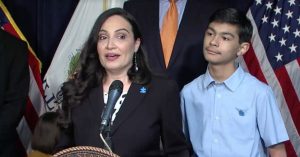State’s ABLE program good news for those with disabilities
By Jean Lotus Staff Reporter — February 6, 2017
Cheva Ramos and her son speak at a press conference announcing the new Illinois ABLE program Jan. 30 at the Thompson Center. (Courtesy Illinois Treasurer’s Office)
Chris Newlon said she’ll be able to rest easier about her 13-year-old daughter’s future, thanks to a new tax-protected savings and investment program for parents of children with disabilities.
State Treasurer Michael Frerichs and a group of parents of announced the new ABLE Alliance financial plan at the Thompson Center Jan. 30.
Parents of children with disabilities and blindness have long been frustrated that their children are ineligible for Social Security Disability payments if they have assets more than $2,000. Frerichs called this asset limit “very low.”
“The Illinois ABLE program will ease the financial burdens that persons with disabilities or blindness face every day,” Frerichs said. “Perhaps no group in America has had more financial roadblocks.”
The new accounts — similar to a 529 college savings account — allow children and parents to save $100,000, invested tax-free, without the risk of becoming ineligible for federal assistance programs. Funds from the account must be spent on education, housing, transportation or expenses related to their condition. Yearly contributions are limited to $14,000, the maximum federal gift amount.
Seventh-grader Rebecca Newlon has Down syndrome as well as hypothyroidism, a heart condition and hearing loss, her mother said. But that did not stop “spunky” Rebecca from working hard in school and wanting to attend college.
“Going to college is huge motivator for someone with a disability,” Chris Newlon said. “Being able to open an ABLE account is going to make a difference between someone simply existing in life and living a really good life. [This program] will allow my daughter and thousands of others to live as independently as possible.”
For two years Illinois legislators and advocacy groups for the disabled had to find a way to take advantage of the federal Achieving a Better Life Experience Act of 2014. The new tax law creates a non-taxable 529A investment account.
Medical advocacy organizations for persons with autism, Down syndrome and spina bifida have pushed for changes to the financial rules.
“This fight has been going on at the federal level for at least 15 years,” Frerichs said.
Frerichs said financial companies weren’t interested in starting a program in Illinois because they did not think there would be enough Illinois participants.
“My staff thought outside the box,” Frerichs said. Illinois formed a 14-state coalition to get the participant pool large enough to attract the financial companies. Participating states are Alaska, Arizona, Illinois, Indiana, Iowa, Kansas, Missouri, Minnesota, Montana, Nevada, New Jersey, North Carolina, Pennsylvania and Rhode Island.
Across the 14 states, half-a-million accounts are expected, almost one-quarter of the entire disability community in the U.S. Frerichs said.
The savings program was shepherded through the General Assembly by State Sen. Scott Bennett (D-Champaign) — who filled Frerich’s vacancy when he was elected State Treasurer — and State Rep. Kelly Burke (D-Chicago).
Ascensus College Savings of Newton, Mass., was chosen to administer the program after a competitive bid process, according to a statement from the State Treasurer’s Office. The treasurer’s office said the plan would have the “lowest fee structure in the nation,” averaging 34 cents for every $100 invested.
In Illinois, 36,000 accounts are expected to be opened by in-state residents in the first five years.
Cheva Ramos said she hoped the program would help her 13-year-old son, Romulus, with an autism spectrum disorder.
“I have high hopes for Romulus, for a college degree and future and financial stability,” Ramos said. Romulus said he hoped to attend college to major in video-game development and film making.
Frerichs said the the program’s “rollout, options and flexibility have exceeded my expectations. This is what happens when we recognize a problem and work together to find solutions,” Frerichs said. “We can come up with something that is so helpful to people.”
“I truly hope this is the beginning of many positive changes for the disability community,” Newlon added.
More information is available on the state treasurer’s website at www.IllinoisABLE.com.
— State’s ABLE program good news for those with disabilities —



